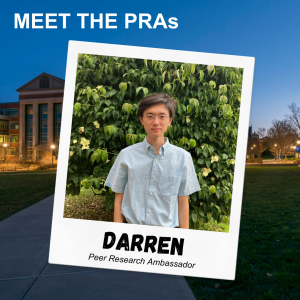Meet Darren Lee ’25, an OUR Peer Research Ambassador (PRA) majoring in Molecular & Cell Biology.
 What is the focus of your research?
What is the focus of your research?
Broadly, I’ve been interested in studying the interactions between organisms and their microbial communities. During my first year, I worked on a Holster Scholar project with Dr. Jonathan Klassen from MCB on fungus-growing ants, which cultivate a co-evolved fungus as their main food source. Work from the lab showed that the ants responded to chemical signals from pathogens, so we wanted to understand how this response was communicated between the ants and fungus. For my project, I evaluated how the ants’ behavior was affected by whether the fungus was alive or dead.
I’ve also worked in Dr. Joerg Graf’s lab, which studies the bacterial community of the European medicinal leech. The leech is an interesting model system since its digestive tract contains a relatively simple microbial community. We experimentally evolved Aeromonas veronii (one of the dominant community members) to look for genetic changes that might confer an advantage in colonizing the leech, then made a mutant A. veronii with the changes we observed to see if they affected the bacterium’s ability to colonize.
Since this summer, I’ve been in Dr. Yanjiao Zhou’s lab at UConn Health where I’ve done some data analysis for several ongoing studies in the lab. So far, I’ve worked on a study looking at a walnut diet in mice—walnuts have a unique nutrient profile that’s been linked to several positive health effects, so we were interested to see if long-term supplementation would lead to lasting changes in the mouse gut microbiome and metabolism.
Why did you get involved in research?
I’ve been a gardener for the longest time, and this has really made me appreciate the idea that there’s a whole world beneath our feet that’s intricately linked with the plants and animals that we can see. When I came to UConn, I was interested in doing microbiology research to pursue this curiosity, and I would say that although it’s taken me in an unexpected direction, I’ve had a really enriching experience so far!
What advice would you give to aspiring student researchers?
Reach out! I’ve often had people say they need to wait to take upper-level classes or apply for a posted opportunity to do research, but if you’ve developed a strong interest in a research topic and can articulate why you’re curious about that particular field, you’re already 90% there. If you’re in that boat, a quick email can go a long way—faculty are always eager to talk with someone who is excited about their work!
What do you enjoy the most about participating in research?
To me, the most fulfilling part of research is the process of asking and answering questions, whether that’s in terms of reviewing the literature on your subject, refining a procedure, or thinking about your next steps after getting data. You’re always pushing yourself to think critically about your approach and your results, and I think that’s a really valuable skill to develop not just for research but also for yourself.
Click here for more information on Darren and other OUR Peer Research Ambassadors.